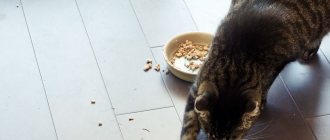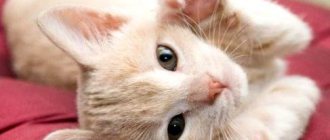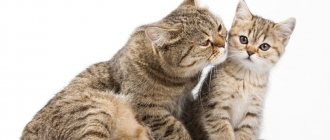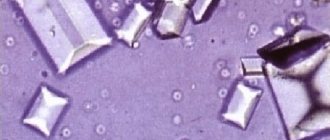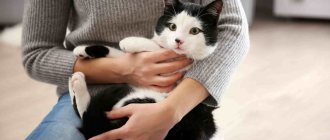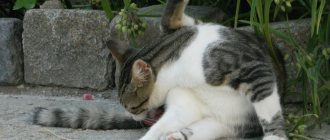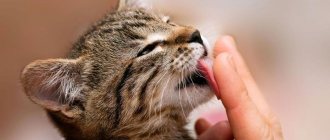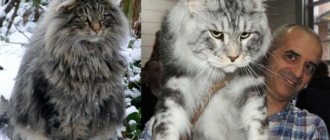Reasons for the habit
A deviation in pet behavior in which a cat sucks or licks clothes, blankets, carpets, its own fur or the tail of another animal is called “sucking syndrome.”
Veterinarians identify the following factors influencing the appearance of the habit:
- The kitten was weaned from its mother before 8 weeks. The problem arises due to lack of care and concern on the part of the cat.
- Various diseases. These include brain tumors, diabetes mellitus, anemia, lack of vitamins and minerals, leukemia, and immunodeficiency virus.
- Stress suffered by animals. Separation from the owner, moving to another apartment, the birth of a child, divorce, unsanitary conditions can lead to such deviations in behavior even in adults.
- Lack of attention. In this way, the pet tries to attract the attention of its owners.
- Sedentary lifestyle. The addiction occurs in cats that do not go outside. Due to lack of stimulation and physical activity, the cat becomes bored and thus seeks care and attention.
- Breed. Scientists have proven that cats of oriental origin are prone to bad habits.
Return to contents
Main reasons
Many cat lovers have noticed similar behavior in their pets. Animals trample on the laps or chests of their owners, as if kneading dough. Some believe that this is how cats massage and even treat people. But if this is so, then why do they knead the bed with their paws? What do these feline movements really mean? We invite you to understand this interesting phenomenon in more detail.
Physiology of cat paws
Cats have a huge number of points on their limbs that form their tactile sensations. It is with its paws that the cat “tests the world” - it crushes and touches various objects, learning about its environment. For example, before stretching out in all its glory on the sofa, your pet will definitely walk around it length and breadth and find the most pleasant place.
There are many glands on the pads of the feet, including sweat glands. This has a very specific purpose - not to scare off the prey with the smell spreading from the body. Scent trails contain a lot of useful information: who they belong to, for whom they are dangerous, and for whom they are a mating signal. In general, if your pet crushes its owner or an object that has fallen under its paws, this thing is already marked and, according to the laws of the jungle, does not belong to you.
Pet's childhood memories
This unusual movement, otherwise called the “baby step,” first appears in childhood. Kittens sucking their mother's milk, relaxing and stretching out their paws, massage the nipple slightly, releasing their claws, this way the secretion of milk is stimulated. At these moments, being next to their mother, they feel completely safe, they are warm, nourished and comfortable.
Being already adults and feeling security and contentment, cats can “relapse into childhood” and knead their owner’s knees, like they once did with their mother’s belly. This version is also supported by the fact that sometimes the “milk step” is accompanied by a quiet smacking of the lips. It has also been noted more than once that animals that are taken from their mother too early exhibit similar behavior more often, as if trying to compensate for what they lost in childhood.
How to wean it off?
In order for a cat to stop sucking a blanket, the very first thing you need to do is eliminate or reduce the number of objects around that can be used for sucking. No source, no problem. You can repel with a spray bottle of water or aromatic oils with citrus scents. Veterinarians also insist on conducting a full examination and identifying possible causative diseases or complications. If a deficiency of nutrients and vitamins is detected, the cat is prescribed a special diet.
It is important to distract the student from unwanted games. Especially important are those that will develop trust between the purr and the owner. When you see your pet doing an obscene activity, you need to distract him for at least 10-20 minutes so that the cat’s brain has time to switch. At the end of the game, you can pet the animal or offer it a treat. Then he will enjoy the entertainment, and not from sucking on the blanket. It is important to provide the child with toys that will not let him get bored during the day when the owners are at work.
Breeders remind you that care should be taken to have several scratching posts, high shelves or a whole complex. The tray and feeding area should be kept clean. Then the animal will feel comfortable and safe. You should never punish or beat someone for bad behavior or strange habits. On the contrary, you need to surround your pet with care, affection and attention, then he will not have the desire to attract attention to himself by sucking on the blanket.
Normal or pathological?
Normal cat hygiene is licking all fur several times a day, and briefly washing after contact with other animals or people. At the same time, the cat behaves calmly and relaxed, she is focused on the cleanliness of her coat.
A disease should be suspected if any movement of the animal is accompanied by licking of fur. At the same time, the cat behaves restlessly, is irritated or feels discomfort. This behavior may indicate itching or pain that the animal is suffering.
If a cat constantly licks itself, the cause of this phenomenon is:
- Parasites;
- Allergic reaction;
- Lichen;
- Dermatitis;
- Endocrine disorders;
In this case, you can detect accompanying symptoms of diseases - scratching of the epidermis, the formation of erosions and wounds, peeling of the skin.
What causes the sucking reflex in kittens?
The mother’s ability to suckle is an unconditioned reflex that ensures the vital functions of the body. A newborn kitten, who can only squeak and suck, chooses its mother's nipple. She grabs it into her mouth, strokes it with her tongue, moves her paws over the mother’s belly, stimulating lactation, and defends the right to food, pushing away her sisters and brothers.
Although the eyes and ears are closed, the sense of smell and touch works:
- the nipple is located by smell;
- body position is adjusted using thermoregulation and tactile receptors.
Important. The first teeth appear from the 12th day; feeding with raw meat is allowed from 3-4 weeks of age. It is cut into thin strips, “worms”, which the kitten swallows with a sucking movement - it cannot chew yet.
A cat in the village or a wild one brings mice, independently accustoming the cubs to solid food. The transition to a normal diet for the species lasts up to 6 months.
People acquire month-old sucklers, sometimes a little older than a month. The transition to food that is convenient for the owner is abrupt; in this case, the sucking reflex does not subside, but this is the most favorable time to wean the kitten from sucking.
Dermatitis in cats
Itching and pain of the skin can be caused by dermatitis. This disease is caused by an immune disorder and the activation of opportunistic microorganisms on the animal's skin. Dermatitis is always accompanied by inflammation of the epidermis.
With moderate inflammation, the animal becomes restless, itching, and the cat constantly licks its fur. Suspecting the disease at this stage is quite problematic.
You might be interested in: How to help a cat if he is coughing as if he is choking?
In most cases, dermatitis is accompanied by visible symptoms - severe peeling of the skin, the formation of rashes, wounds and erosions. The rashes are most often localized on the pet's face, near the ears and on the neck.
Treatment is carried out using external agents, but only after identifying the pathogen.
Why does a cat suck a blanket, blanket, tail or paw?
Owners don’t think about how to wean a cat from sucking a blanket if every morning the pet has a happy face:
- jumps on the bed;
- paws;
- purrs with pleasure.
This behavior is a sign of trust and love between the pet and its owner. Sucking on a blanket saturated with the scent of a person of the highest rank in the family is a recognition of strength and, at the same time, one’s own safety.
If the cat sucks on blankets and other bedding not in the morning, there are several reasons:
- Impaired metabolism.
- Stressful situation (sucking calms).
- The kitten is teething.
- The sucking reflex has not faded in a baby or an already mature cat.
Sucking a tail or paw should alert the owner : perhaps the cat is trying to pull out a splinter. If, when you carefully feel the paw, the cat withdraws the limb, you will need the help of a veterinarian. If no pain is observed, he may have been taken away from his mother early or he is experiencing severe stress.
Ways to eliminate this habit
If the owner is not satisfied with the pet’s similar habit, then you can try to wean him from this behavior. The following tips will help with this:
- Play with the cat. Sometimes active time together removes the cat’s desire to lick for a long time.
- Apply catnip to your pet's toys. An attractive aroma will distract the cat from its owner, and it will show care on objects that cannot resist.
- The causes of licking need to be taken seriously. However, if it causes a lot of inconvenience, then negative reinforcement can be used. Gently and firmly push your pet away when he tries to lick. Over time, he will realize that all his efforts are in vain.
- If the habit is caused by stress experienced by the cat, then animal psychologists recommend hugging your furry friend more often. This will relieve your cat's anxiety and calm her down.
Finally, I would like to note that under no circumstances should you react sharply negatively to your mustachioed pet’s attempts to lick. This may injure the animal. It is important to understand the reasons why it does this. If the cat was raised by the owner from early childhood, was fed with a pipette and got used to the tenderness of the leader, then you need to come to terms with and calmly treat such affection. In any case, you need to be careful with your pet, because his feelings for his owner are selfless.
Why does a cat lick the floor and walls?
If a cat licks walls, concrete surfaces, wallpaper, or eats chalk with pleasure, the reason should be sought in functional system failures in the body, which are provoked by the deterioration of the furry pet’s health. As a rule, this behavior of cats is provoked by a deficiency of macro-microelements in the animal’s body.
© shutterstock
If a cat begins to lick the floor, the wall is littered with marks from the cat’s teeth; one of the possible reasons is hypocalcemia. Characterized by a violation of phosphorus-calcium metabolism. The disease develops due to a deficiency of calcium and vitamin D3.
Hypocalcemia worsens in females during pregnancy and lactation. In kittens - during a period of intensive growth and development.
When a cat wants to lick the walls, some of the reasons for this condition include::
- hypovitaminosis;
- endocrine pathologies;
- metabolic disorder;
- gastrointestinal diseases;
- helminthic infestations;
- unbalanced diet;
- liver problems.
If a cat licks the floor, concrete, walls, tiles, another common cause is anemia, which develops in animals against the background of iron deficiency. In this condition, the mucous membranes turn pale, the cat looks depressed, lethargic, and the digestive processes in the body are disrupted.
Note that anemia can be a symptom of viral and bacterial infections and diseases of various etiologies . Therefore, if you notice uncharacteristic behavior of your cat or symptoms indicating deterioration in health, take your pet to the veterinary clinic for an examination.
© shutterstock

